268
Views & Citations10
Likes & Shares
Background: Brain Gym Exercises can significantly improve the cognitive function of the adults. The positive impact of Brain Gym on the adult, after two weeks of implementation there has been an increase in memory, cognitive function, concentration, attention and alertness to reduce senility or dementia. Exercise influences the brain in ways in protection of memory and thinking. Physical exercise training has greater impact on spatial memory, working memory and executive attention.
Method: 30 Subjects of age 30-40 years suffering were separated into two groups. 15 subjects, who were included in the control group were given regular breathing exercise and the remaining 15 subjects who were included under the experimental group were treated with brain gym exercises for a period of six weeks, one hour per day for 5 days per week. The outcome measure used was Memory Functioning Questionnaire (MFQ).
Result: Statistically analysis was done by paired t-test. From the result of the statistics, the loss of memory of subjects was prevented.
Conclusion: The study concluded that brain gym exercise was more effective in improving memory among adults.
Keywords: Brain gym exercise, Cognition, Memory, Memory function, Memory function questionnaire
Brain Gym describes a set of exercises which influences the areas of concentration and memory [3]. It helps to improve academics, coordination, organization and attitude [4]. It is based on principle of training the person through movements.
Brain Gym Exercises [5] was originally framed to improve learning through mind body exercises [6]. Exercise improves the circulation and stimulates changes in the brain that improves learning. Brain Gym Exercises can significantly improve the cognitive function of the adults [7,8]. The positive impact of Brain Gym on the adult, after two weeks of implementation, has shown a great increase in memory, cognitive function, concentration, attention and alertness to reduce senility or dementia [9,10]. Physical exercise training has greater impact on memory [11]. It improves the learning skills of students [12].
Brain Gym helps students to achieve their target easily. It is also used by athletes, in promoting their skill. Brain Gym is considered as a useful tool, enhancing people to influence changes in areas and thereby recall the memory which was stagnated [13,14].
In middle- aged people, memory is a cognitive function that often tends to decline. Long-term memory is rarely changed, while short-term memory can be instantaneously deteriorating in 0-10 min. Some studies stated that brain gym and memory games therapy can prevent dementia [15]. Brain Gym can be used to stimulate cognitive function at every stage of the game, and are proven effective in improving cognition function in the elderly [16]. The benefits of brain gym include reducing emotional stress, improving the relationship between humans and learning atmosphere/work more relaxed and happier, increasing the language and memory skills, causing people become more enthusiastic, more creative and efficient. People will feel healthier because of reduced stress and improving their learning and work performance [17].
AIM AND OBJECTIVE
The aim of study was to assess effects of Brain Gym Exercises in improving memory among adults.
RESEARCH DESIGN AND METHODOLOGY
An experimental study design was conducted with 30 patients within the age group ranging between 30 and 40 years who fulfilled the inclusion and exclusion criteria.
Inclusion Criteria
- Age group - 30 to 40years
- Both male and female
- Mild cognitive impairment
- Dementia
- Low physical activity
Exclusion Criteria
- Diabetes
- High blood pressure
- Alcohol addiction
- Visual and Auditory impairment
- Psychiatric problem
Outcome Measures
- Memory Functioning Questionnaire (MFQ)
PROCEDURE
Sample selection was done based on the inclusion and exclusion criteria. Consent form was received from the subjects in written format. Study consists of 30 subjects ranging within the age group between 30-40years. They were divided into 2 groups, namely Group A and B. After explaining subjects about the treatment, assessment was taken prior to the commencement of treatment with outcome measure. The total population group of (n= 30) was divided into 2 groups.
Group-A: Control group- 15 SUBJECTS-(Regular Breathing exercises)
Group-B: Experimental group -15 SUBJECTS-(Brain gym exercises)
The 15 subjects in the control group were asked to perform breathing exercise and the 15 subjects in the experimental group were trained to perform the brain gym exercises for a duration of one hour per day. It was continued for 5 days per week for 6 weeks. The demographic data and pre- intervention variables of Memory Functioning Questionnaire (MFQ) were measured and documented. Data analysis was done based on their grades.
The Brain Gym exercises are:
Brain Buttons: Place one hand across the belly button and rub the brain buttons with the other hand. Then move the eye left and right (Figure 1).
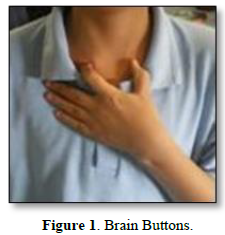
Cross Crawl: Marching on the spot touching the right knee with the left-hand and then touching the left knee with right hand (Figure 2).
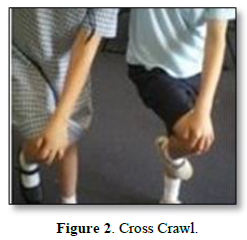
Unlocking Ears: Place the hands at the top of both ears. Gently unroll the ears from the top to the bottom (Figure 3).
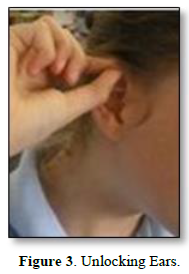
Hook ups: Cross the leg. Extend the arms, cross them over at the wrist, lift up fingers and bring the hand above to the chest close the eyes, hold and focus on the breathing (Figure 4).
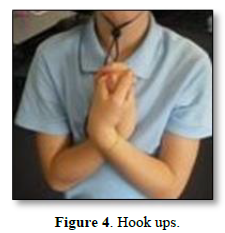
Air Drawing: Pointing with both fingers, drawing in air, make sure right and left fingers are in symmetry with each other (Figure 5).
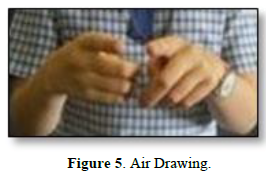
Figure Eights: Point the fingers and draw huge figure eight sideways in the air. Make sure cross over both side of the body and take turns with both hands (Figure 6).
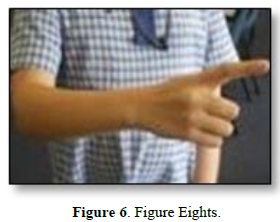
More Hook ups: Join the finger tips together to make a tent. One at the time, tap each finger pair together (Figure 7).
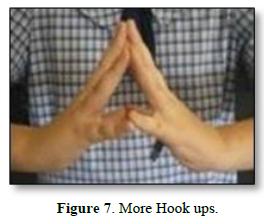
METHODOLOGY
Statistical Analysis
Descriptive variables
- Mean and Standard deviation for variables like Age, MFQ
- Frequency distribution for categorical variables like Gender
Inferential Statistics
- Intra Group - Paired Sample t-test
- Inter Group - Independent Sample t-test
Hypotheses
Null Hypothesis, H0: µd = 0
There is no significant effect of Control group A or Experimental group B in terms of measures such as MFQ
Alternate Hypothesis, H1: µd>0
There was significant effect of control group A or Experimental group B in terms of measures such as MFQ
µd = mean difference between Pre and Post-test scores;
d = difference between post and pre-Test Score
Level of significance, α = 0.05
Test applied: Paired Sample t-test
Inferential Statistics
Testing the effect of control group-Treatment - A in increasing the value of MFQ from Week 1 (Pre) to Week 6 (Post)
H0: There is no significant effect of Treatment A in increasing the value of MFQ from Week 1 (Pre) to Week 6 (Post)
H1: There is significant effect of Treatment A in increasing the value of MFQ from Week 1 (Pre) to Week 6 (Post)
The above hypothesis is tested by use of paired t-test and the output is as follows (Output of Paired t-test):
Control Group:
t-Test: Paired Two Sample for Means (Table 1 & Graph 1).
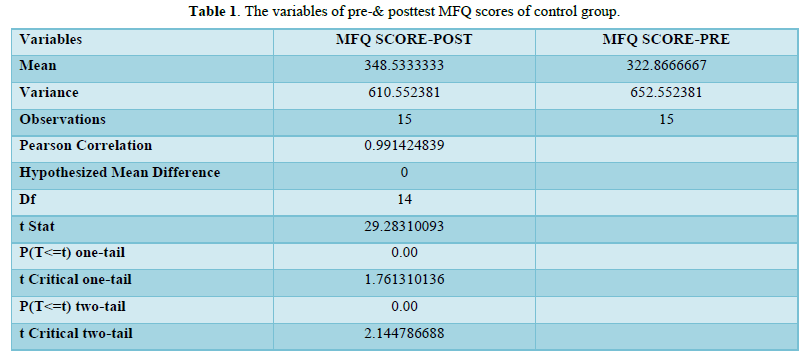

Result: Test Statistic: t = 29.28, P = 0.000 < 0.05
Conclusion: Since the p value of the test statistics is less than 0.05, the null hypothesis is rejected at 5% level of significance (t = 29.28, p < 0.05). In addition, mean MFQ has increased from Week1-Pre-test to Week6-Post-test in Group A. Hence, it is concluded that there is significant effect of Treatment A in increasing the value of MFQ from Week 1 to Week6.
Testing the effect of Experimental Group - Treatment B in increasing the value of MFQ from Week 1 (Pre) to Week 6 (Post)
H0: There was no significant effect of Treatment B in increasing the value of MFQ from Week 1 (Pre) to Week 6(Post)
H1: There was significant effect of Treatment B in increasing the value of MFQ from Week 1 (Pre) to Week 6 (Post)
The above hypothesis was tested by use of paired t-test and the corresponding output is as follows (Output of Paired t-Test)
Experimental Group (Table 2 & Graph 2)
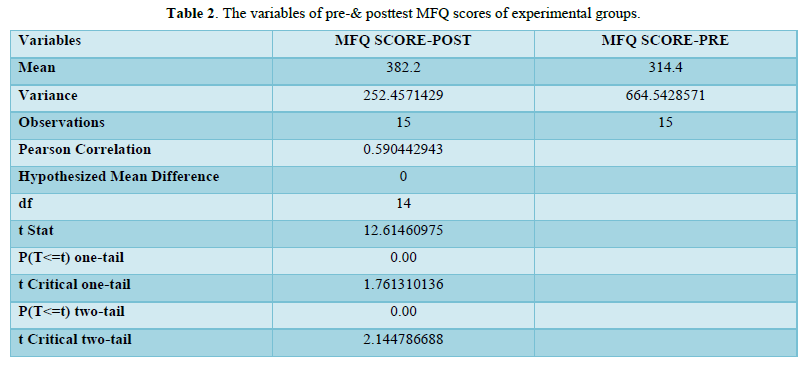
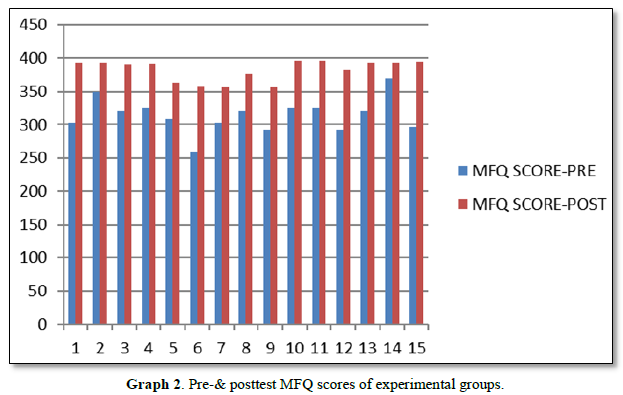
Result: Test Statistic: t =12.61, p < 0.05
Conclusion: Since the p-value (0.000) of the test statistic is less than 0.05, the null hypothesis was rejected at 5% level of significance (t = 12.16, p < 0.05). In addition, mean MFQ has been increased from Week1-Pre-test to Week6-Post-test in Group B. Hence, it was concluded that there was significant effect of treatment B in increasing the value of MFQ from Week 1 to Week6.
Inter-Group Analysis (Between Group Analysis)
Comparing the effect of Treatments, A and B in terms of changes in MFQ from Week 1 (Pre) to Week 6(Post)
H0: There was no significant difference between Group A and B in terms of average change in MFQ
H1: There was significant difference between Group A and B in terms of average change in MFQ
The above hypothesis is tested by the use of Independent Samples t-test.
Output of Independent Sample t-test (Table 3 & Graph 3)
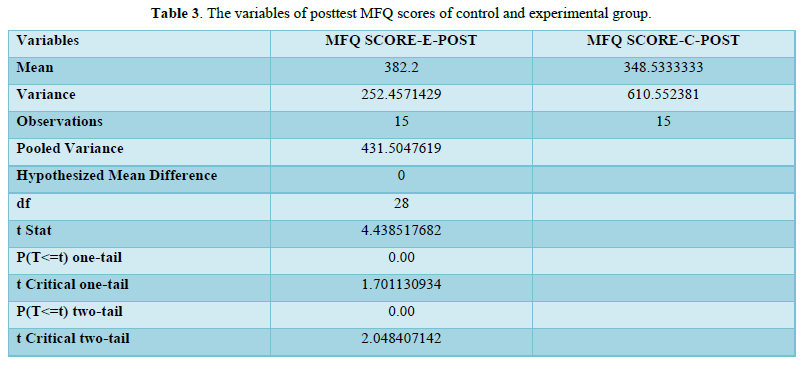
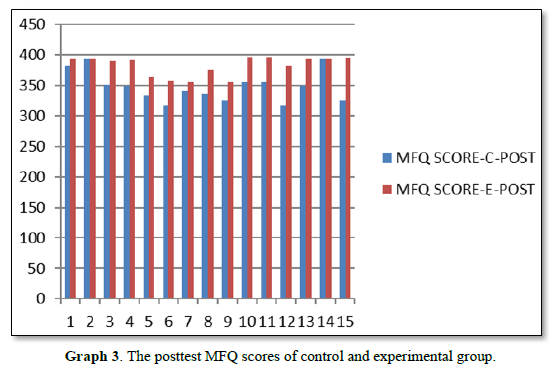
Result: t =4.43, p< 0.05
Conclusion: Since the p-value of the test statistic is less than 0.05, the null hypothesis is rejected at 5% level of significance at p < 0.05. In addition, value of MFQ from Week 1(pre) to Week 6 (post) by Treatment B is more than that of Treatment A. Hence, it is concluded that the experimental group (Group-B) subjects who were given brain gym exercise is more effective than control group (Group-A) in increasing the value of MFQ from Week1 (pre) to Week 6 (post).
DISCUSSION
Brain exercise can significantly improve the cognitive function of the adults [18]. In this study, experimental research was done to find effect of Brain Gym exercises in improving memory [19,20]. 30 subjects were recruited for the study. Intervention was given for 6 weeks. The result concluded that the data collected was statistically analyzed by paired t-test. The result revealed that the memory span of the subjects has increased more in experimental group, where the subjects performed brain gym exercises than that of control group. Brain Gym energy exercise helps to re-establish neural connection between body and brain [21]. Brain Gym can improve self- confidence, self-esteem, co-ordination and memory. It plays a crucial role in exercising day-dreaming, stress release and achievement of goals [22,23]. The Brain Gym exercise influences the attention and ability to retain memory [24]. Deninson in 1986 stated that they are sample and enjoyable exercise to enhance whole brain learning. They are skills which can be used to enhance students learning as stated by Deninson in1984. Brain Gym exercises are suggested to be used to bring out the full potential of the students. Freeman-Koestar-2000, a leading expert on Brain Gym suggested that brain Gym should be performed for 15 min spread out over the course of the study. Templeton and Jensen- (1996) mentioned that the Brain Gym exercise gives the sense of hope in improving the behavior.
CONCLUSION
From the result of the statistics, it was evident that the memory span of the subjects has been increased in the experimental group who performed brain gym exercises. Hence, the study concluded that brain gym exercise was more effective in improving memory among adults.
CLINICAL SIGNIFICANCE
Brain gym exercise stimulates the chemicals in the brain and neuroplasticity by boosting growth factors and thereby improves memory. It plays a vital role in improving memory among adults.
- Denison P (2014) Impact of teaching time on attention and concentration of Nursing and Health science.
- Pero S, Incoccia C, Caracciolo B, Zoccolotti P, Formisano R (2008) Rehabilitation of attention in two patients with traumatic brain injury by means of attention process training. Brain Inj 20(11): 1207-1219.
- Bossers WJR, Scherder EJA, Boersma F, Hortobágyi T, van der Woude LHV, et al. (2014) Feasibility of a combined aerobic and strength training program and its effects on cognitive and physical function in institutionalized dementia patients: A pilot study. PLoS One 9(5): e97577.
- Bennet T, Malia K (2012) Rehabilitation of attention and concentration deficits following brain injury. J Cognitive Rehab.
- Smith PJ, Blumenthal JA, Hoffman BM, Cooper H, Strauman TA, et al. (2010) Aerobic exercise and neuro-cognitive performance: A meta-analytic review of randomized controlled trials. Psychosom Med 72(3): 239-252.
- Sullivan O (2011) Educational Kinesiology or Brain Gym exercises improving cognition level for adults.
- Luton LM, Reed-Knight B, Loiselle K, O'Toole K, Blount R (2013) A pilot study evaluating an abbreviated version the cognitive remediation program for youth with neuro-cognitive deficits. Brain Inj 25(4): 409-415.
- Watson A, Kelso GL (2014) Effect of brain gym on academic engagement for children with developmental disabilities. Int J Special Educ 29(2): 1-9.
- Yágüez L, Shaw KN, Morris R, Matthews D (2011) The effects on cognitive function of a movement-based intervention in patients with Alzheimer type dementia: A pilot study. Int J Geriatr Psychiatry 26(2): 173-181.
- Barnes DE, Santos-Modesitt W, Poelke G, Kramer AF, Castro C, et al. (2013) The mental activity and exercise (MAX) trial: A randomized controlled trial to enhance cognitive function in older adults. JAMA Intern Med 173(9): 797-804.
- Forte R, Boreham CAG, Leite JC, De Vito G, Brennan L, et al. (2013) Enhancing cognitive functioning in the elderly: Multicomponent vs Resistance training. Clin Interv Aging 8: 19-27.
- Abduh B, Tahar MM (2018) The effectiveness of brain gym exercise and brain training intervention on working memory performance of students with learning disability. J ICSAR 2(2): 105-111.
- Nursalam N, Kurniasari S, Ulfiana E, Efendi F (2018) The effect of sleep hygiene and brain gym on increasing elderly comfort and sleep quality. Indian J Public Health Res Dev 9(12): 589.
- Murtadho MA, Ulfiana E, Suyatmana SH (2019) The Effectivity of Brain Gym and Memory Games Therapy for Improving Cognitive Function in Elderly People with Dementia. Indian J Public Health Res Dev 10(9): 1428-1433.
- Godman H (2014) Regular exercise changes the brain to improve memory, thinking skills. Available online at: https://www.health.harvard.edu/blog/regular-exercise-changes-brain-improve-memory-thinking-skills-201404097110
- Bherer L, Erickson KI, Liu-Ambrose T (2013) A review of the effects of physical activity and exercise on cognitive and brain functions in older adults. J Aging Res 2013: 657508.
- Yanagita T (2018) How functional defect affection fatty liver and brain function disorders.
- Kulkarni C, Khandale SR (2019) Effect of brain gym exercises on the attention span in young adults. Int J Adv Res Dev 4(4): 71-75.
- Lamba S, Rawat A, Jacob J, Arya M, Rawat J, et al. (2014) Impact of teaching time on attention and concentration. J Nurs Health Sci 3(4): 1-4
- Astle DE, Barnes JJ, Baker K, Colclough GL, Woolrich MW (2015) Cognitive training enhances intrinsic brain connectivity childhood. J Neurosci 35(16): 6277-6283.
- Ballesteros S, Mayas J, Prieto A, Toril P, Pita C, et al. (2015) A randomized controlled trial of brain training with non-action video games in older adults: Results of the 3-month follow-up. Front Aging Neurosci 7: 45.
- Küster OC, Fissler P, Laptinskaya D, Thurm F, Scharpf A, et al. (2016) Cognitive change is more positively associated with an active lifestyle than with training interventions in older adults at risk of dementia: A controlled interventional clinical trial. BMC Psychiatry 16(1): 315.
- Ocampo Jr JM, Varela LP, Ocampo LV (2017) Effectiveness of Brain Gym Activities in Enhancing Writing Performance of Grade I Pupils. SOSIOHUMANIKA: Jurnal Pendidikan Sains Sosial dan Kemanusiaan 10(2): 179-190.
- Cancela JM, Suárez MHV, Vasconcelos J, Lima A, Ayán C (2015) Efficacy of Brain Gym training on the cognitive performance and fitness level of active older adults: A preliminary study. J Aging Phys Act 23(4): 653-658.
QUICK LINKS
- SUBMIT MANUSCRIPT
- RECOMMEND THE JOURNAL
-
SUBSCRIBE FOR ALERTS
RELATED JOURNALS
- Journal of Renal Transplantation Science (ISSN:2640-0847)
- Journal of Alcoholism Clinical Research
- Journal of Clinical Trials and Research (ISSN:2637-7373)
- Oncology Clinics and Research (ISSN: 2643-055X)
- Stem Cell Research and Therapeutics (ISSN:2474-4646)
- International Journal of Anaesthesia and Research (ISSN:2641-399X)
- International Journal of AIDS (ISSN: 2644-3023)








